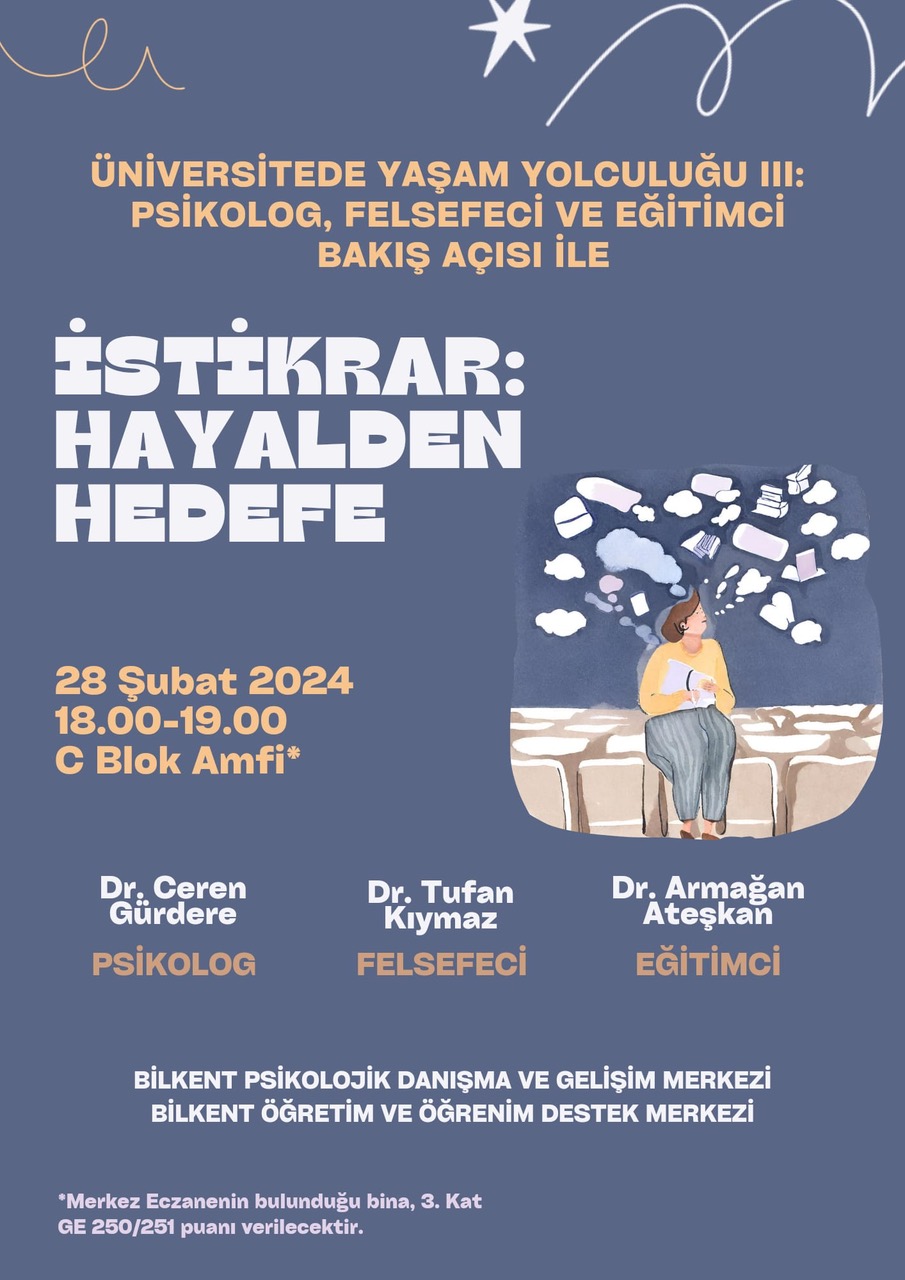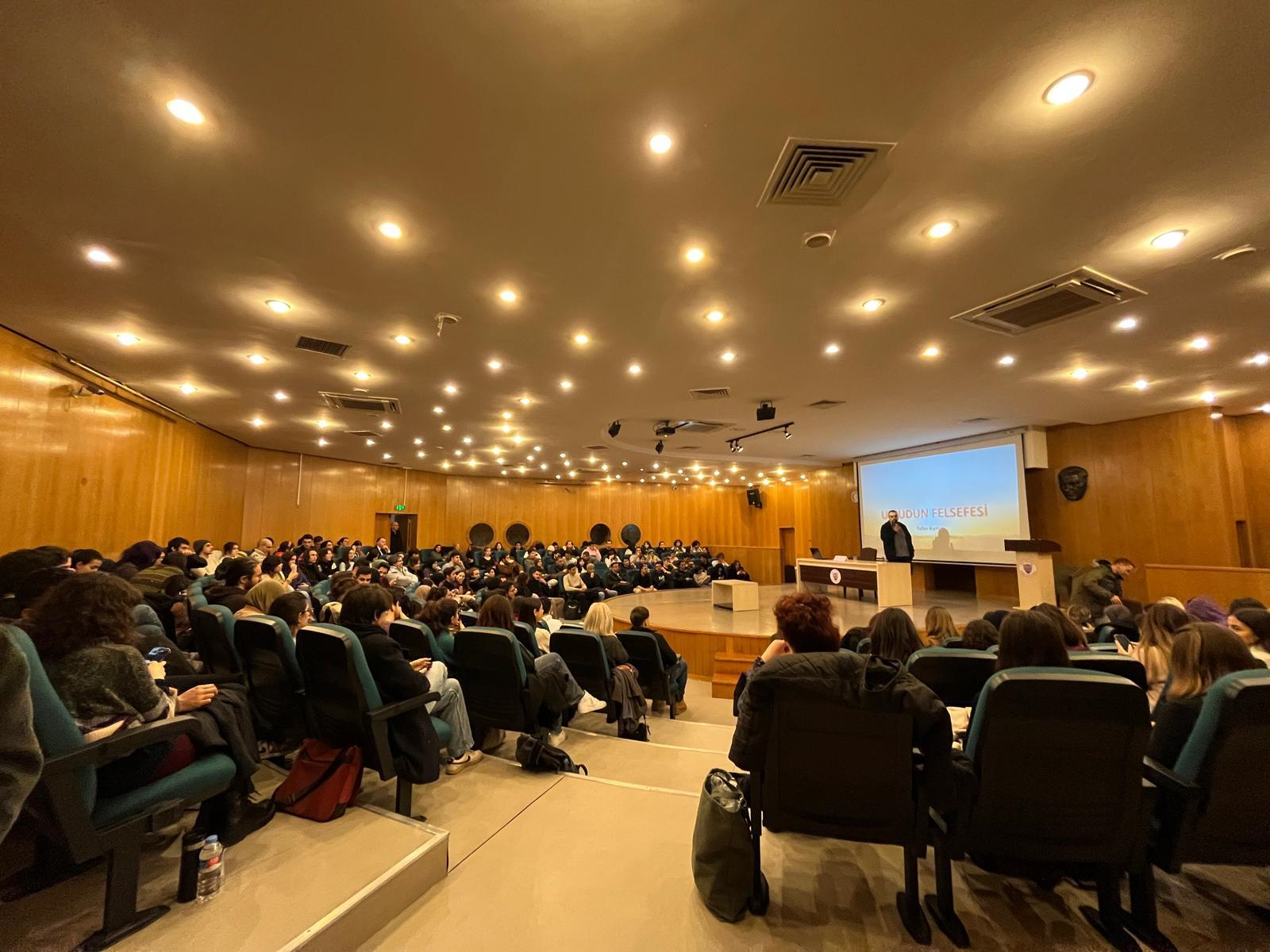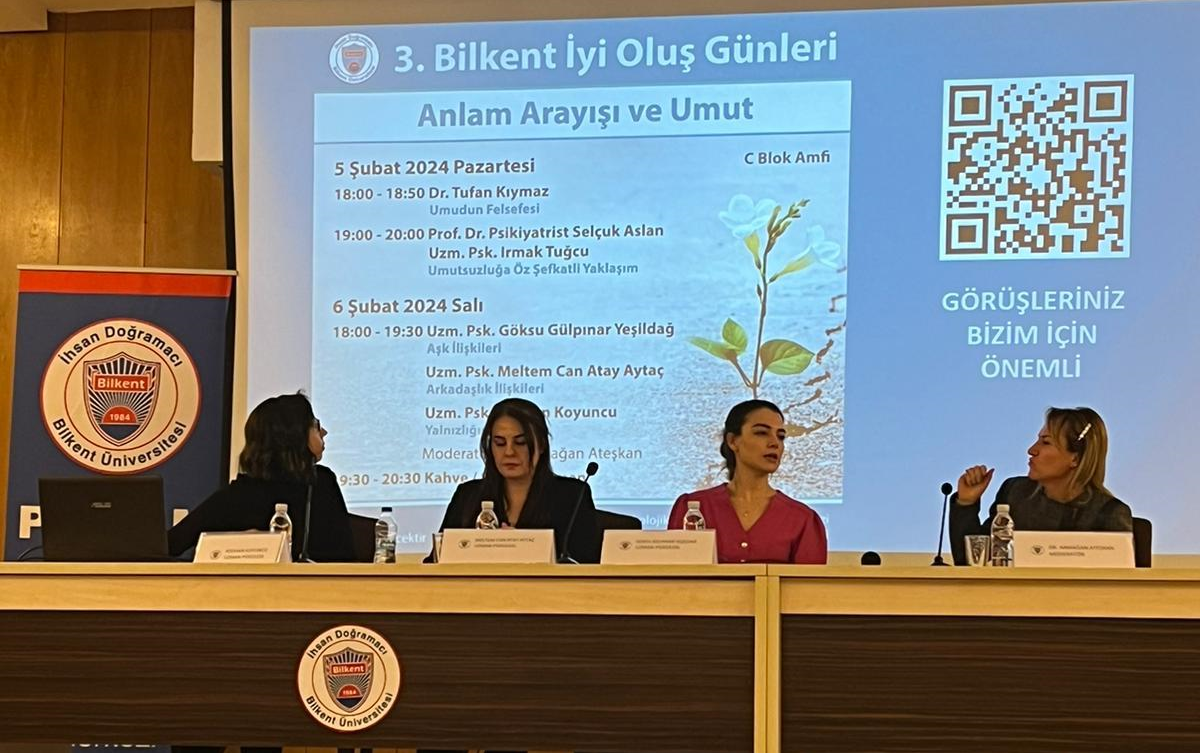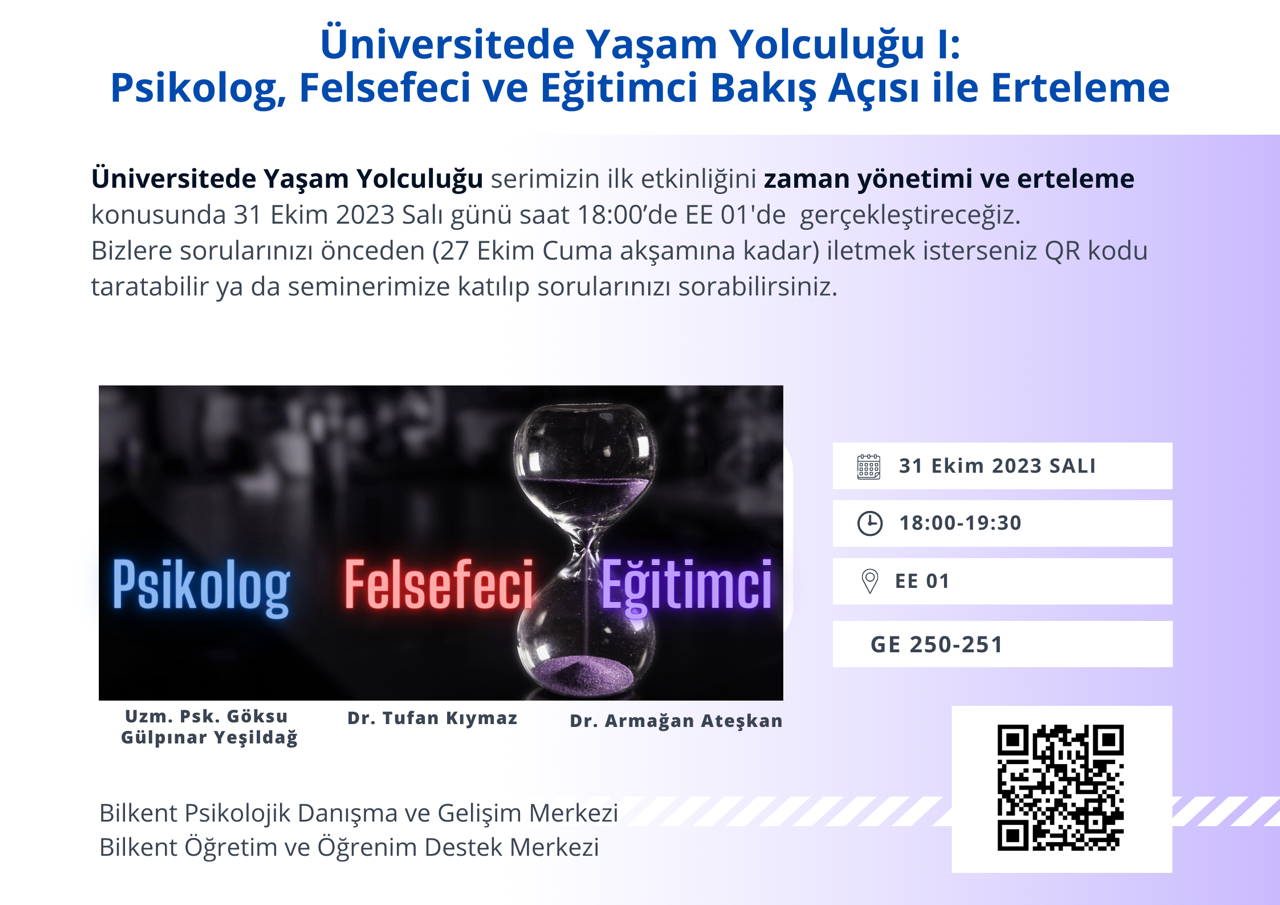
Effective Note-Taking: A Key to Learning
Do you struggle with taking notes during lectures, meetings, or presentations? Do you find yourself forgetting important information or missing key points? If so, this seminar is for you! In this seminar, you will learn how to:
– Choose the best note-taking method for different situations
– Organize your notes for easy review and recall
– Use abbreviations, symbols, and diagrams to save time and space
– Enhance your notes with colors, highlights, and annotations
– Review your notes regularly and effectively
-Take notes while reading and studying
Date and Time: February 22, 18:00-19:00,
Place: EE-01
Speakers: Dr Armağan Ateşkan, Elif Şeşen, İzel Sarı Aydın
The event will be in English and is within the scope of GE 250/251.
3. Bilkent Well-Being Days (5-6 February 2024)

This year for the 3rd time, the Psychological Counseling and Development Center and the Teaching and Learning Support Center (BTLSC) hosted the “Bilkent Well-Being Days.” This year’s theme was “Hope and Search for Meaning.”
The program started with Dr. Tufan Kıymaz’s talk on the philosophy of hope, followed by Prof. Dr. Psychiatrist Selçuk Aslan’s presentation on self-compassionate approach to hopelessness with the moderation of Clinical Psychologist Irmak Tuğcu. On Tuesday, a panel took place on the social aspects of meaning and hope, with Dr. Armağan Ateşkan’s moderatorship. Clinical psychologists Göksu Gülpınar Yeşildağ, Meltem Can Atay Aytaç and Aslıhan Koyuncu shared insights on romantic relationships, friendship and managing loneliness, respectively.


 How to Write a Philosophy Essay
How to Write a Philosophy Essay
Thursday, April 16, 2020 12:40 – 1:30 pm
Online
Speaker: Tufan Kıymaz, Department of Philosophy, Bilkent University
PHIL 243/244, Social and Political Philosophy I/II, is a 6-credit 2-semester second-year course for law, political science, international relations and economics students and it is the only required philosophy course in their curriculum. Writing an essay is one of the most important components of this course. However, writing a philosophy essay has its own conventions and standards. In this talk, with an emphasis on the requirements of PHIL 243/244, students will gain perspective on how to write a philosophy essay.
About Tufan Kıymaz
Dr. Tufan Kıymaz received his PhD in Philosophy, with a minor in History and Philosophy of Science, from Indiana University, Bloomington, in 2017. The same year he joined the philosophy department in Bilkent. His main area of research is philosophy of mind, more specifically, the possibility of fully materialistic and scientific explanation of consciousness. He was active in Indiana University Center for Innovative Teaching and Learning, both as a participant in workshops and learning communities, and also as workshop facilitator.
Time Management
Thursday, November 14, 2019 12:40 – 1:30 pm
Faculty of Engineering, EA 409
Speaker: Robin Turner (FAE)
This talk looks at how we can organise the things we do better in order to be more productive, have more free time and feel less stressed about all the things we have to do. It focuses on three types of task – scheduled events, to-do items and habits – and tools for managing them. The aim is not to be a hyper efficient worker who fills every second productively but to find the minimum effective dose to get things done, avoid overwhelm, and enjoy life.
About Robin Turner
Robin Turner teaches in the Faculty Academic English Programme, coordinates Bilwrite and is a member of the Bilkent Education Technology Support team. His other interests include life hacking, role-playing games, fantasy and science fiction, and martial arts. He probably spends too much time on Netflix.
How to make a successful presentation?
Wednesday, November 13, 2019 5:30 – 6:40 pm
Faculty of Economics, Administrative and Social Sciences C-Block Auditorium
Speaker: Dr. Tufan Kıymaz, Department of Philosophy, Bilkent University
Verbal presentation is a requirement for many courses. In this talk, frequent mistakes in making and designing presentations will be explained. Some strategies to avoid these mistakes and to make successful presentations will be discussed.
About Tufan Kıymaz
Tufan Kıymaz received his PhD in Philosophy, with a minor in History and Philosophy of Science, from Indiana University, Bloomington, in 2017. The same year he joined the philosophy department in Bilkent. His main area of research is philosophy of mind, more specifically, the possibility of fully materialistic and scientific explanation of consciousness. He was active in Indiana University Center for Innovative Teaching and Learning, both as a participant in workshops and learning communities, and also as workshop facilitator. He was an accepted participant in American Association of Philosophy Teachers seminar on teaching college-level philosophy.
How to write a philosophy essay for PHIL 243/244?
Wednesday, November 6, 2019 5:30 – 6:40 pm
Faculty of Economics, Administrative and Social Sciences C-Block Auditorium
Speaker: Dr. Tufan Kıymaz, Department of Philosophy, Bilkent University
PHIL 243/244, Social and Political Philosophy I/II, is a 6-credit 2-semester second year course for law, political science, international relations and economics students and it is the only required philosophy course in their curriculum. Writing an essay is one of the most important components of this course. However, writing a philosophy essay has its own conventions and standards. In this talk, with an emphasis on the requirements of PHIL 243/244, non-philosophy students will gain perspective on how to write a philosophy essay.
About Tufan Kıymaz
Tufan Kıymaz received his PhD in Philosophy, with a minor in History and Philosophy of Science, from Indiana University, Bloomington, in 2017. The same year he joined the philosophy department in Bilkent. His main area of research is philosophy of mind, more specifically, the possibility of fully materialistic and scientific explanation of consciousness. He was active in Indiana University Center for Innovative Teaching and Learning, both as a participant in workshops and learning communities, and also as workshop facilitator. He was an accepted participant in American Association of Philosophy Teachers seminar on teaching college-level philosophy.
Note Taking
Thursday, October 31, 2019 12:40 – 1:30 pm
Electrical and Electronics Engineering, EE 01
Speaker: Andrew Bonar (FAE)
This session will look at the “5 R’s of note-taking” and the Cornell Note-taking Method, as well as a brief introduction to mind maps, to introduce students to the theories and practices behind taking effective notes for the support of learning. The purpose of this session is to help students devise strategies to reduce their workload and improve their learning and retention of knowledge.
About Andrew Bonar
Andrew Bonar has been teaching at Bilkent University since 2011. Before that studied and taught in Canada. He served two years on the University of Manitoba’s Board of Governors, Senate, Senate Executive, Senate Committee on University Research, Senate Committee on Instruction and Evaluation, and in many other administrative roles, including as President of the Graduate Students’ Association, while completing his MA degree.
“Etkili Zaman Yönetimi” (Time Management) given by Psychological Counseling and Development Center (PDGM)
Thursday, October 17, 2019 12:40 – 1:30 pm
Faculty of Art, Design and Architecture, FFB 05 (Seminar is in Turkish)
This seminar includes practical tips for students to identify their personal time management challenges, and schedule their time effectively.
Content of the Seminar:
How do you spend your time every day?
Do you want to organize your life and use your time effectively?
Time management requires thinking and planning.
What do you need to use time effectively?
“Erteleme” (Procrastination) given by Psychological Counseling and Development Center (PDGM)
Thursday, October 24, 2019 12:40 – 1:30 pm
Faculty of Art, Design and Architecture, FFB 05 (Seminar is in Turkish)
From time to time, it might be hard to stay motivated to complete the things to do. In such cases, we may prefer to postpone them. On the other hand, when this situation becomes chronic, we may try to distract ourselves. If you leave your projects, exams, almost everything to the last minute, you might be a procrastinator. Most of the time, procrastination itself can be more of a symptom than a problem. Therefore, although it is important to learn how to overcome procrastination, why we do not want to complete the work is also very crucial. We will start our presentation with the question “Why do we procrastinate? and continue with the question “How do we handle procrastination?”.